After two years of lockdowns during which many businesses pivoted to community, we knew community managers would have an appetite for coming together in-person.
The inaugural Guild Community Summit was billed as 'the biggest community event outside of the US' and 'the best community event in the world', but we didn’t quite realise how just how big the appetite was for meeting and learning from others in-person.
Feedback included: “a really inspiring and insightful day”, “one of those FOMO inducing events for sure” and “I hope it’s the inaugural one as if it’s as good as this year then I already look forward to attending next year”.
So great being back in a room full of community managers💙
— Lizzy Roberts (@imalizzzard) May 19, 2022
thanks for putting this together #GuildCommunitySummit pic.twitter.com/E8osu50BFv
If you couldn’t join us this time, don’t worry, here are some of the key learnings from the day.
And if you want exclusive access to speaker slides and videos, then join Guild Community Collective, a free online community for community professionals. You'll also be the first to hear about the next Guild Community Summit.

What we learned from Venessa Paech, Co-Founder, Australian Community Managers
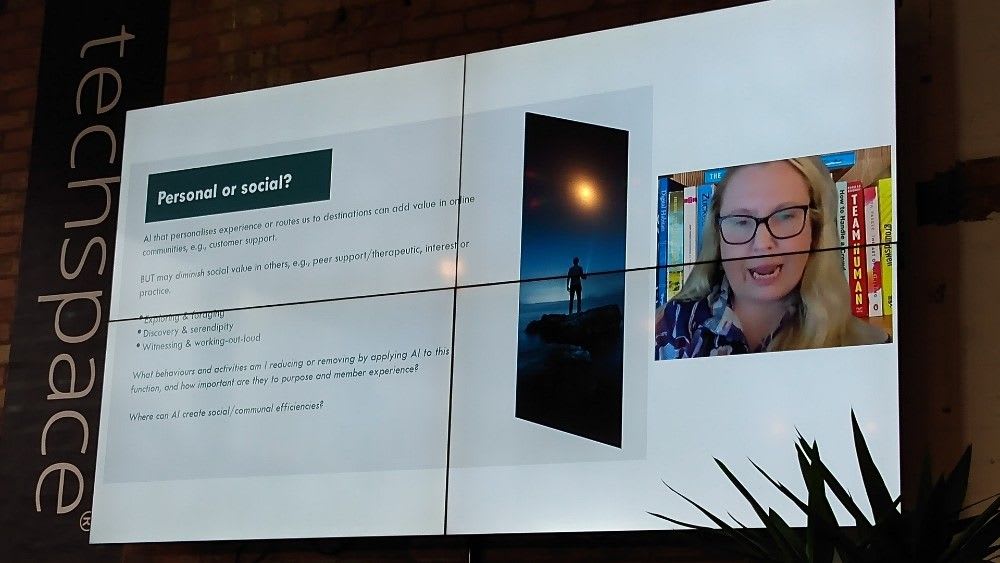
Venessa Paech is one of the most experienced and respected community professionals in the world. She's Australia’s leading expert in online communities and community management, with over 20 years' experience building, managing and leading online communities, including for Lonely Planet and Australia Post. Venessa is a published academic, and a PhD Candidate researching AI and online communities.
What we didn't know about Venessa is that she can definitely bust some dance moves! 💃
She entertained us all with some top quality on-screen dancing whilst we ensured that delegates could hear her from 10,500 miles away.
Venessa highlighted the value of AI for community building and community management and presented a decision-making framework to minimise harms and maximise benefits for your community. One attendee said this talk “changed my views on the role of AI in communities”.
Venessa noted that while community is fundamentally a human practice “the machines are already here”. If you’re building community in a digital context you’re already dealing with algorithms, assistants and automations on social media platforms and online community platforms.
“If we’re going to be good community managers and good community strategists we need to develop an understanding of how we incorporate AI strategically – it’s not an add-on”.
There is clearly potential value and potential risk, so Venessa has created a decision making framework to evaluate how far AI in your community can:
Automate burden – including low-level reactive moderation with keyword filters, onboarding, engagement nudging and simple reward and recognition functions. Transparency, creativity and context are key for getting this use right.
Organise meaning – AI can help with tagging and classifying content, personalisation and moving and organising sections. It can analyse and detect trends and report back to the community manager. Those valuable resources that communities create can potentially become more “malleable, discoverable, useful over time” – the human element is still crucial but AI tools can add speed and ease to the community manager role.
Build insights – “community over the last couple of decades is really leaning into its nerd self” – AI tools can help community builders to map networks, connections and influence, measure social capital and uncover social roles. We all love to celebrate “cheerleaders and champions” and a well-trained AI machine can alert a harassed community manager to just the kind of activity they want to encourage.
All of these can add up to better outcomes for your community, but community professionals are essential as “context coaches” to avoid negative effects like those we’ve seen with algorithms in social media.
Venessa recommended that AI should come later in the community journey and the human element of community building and management is still the most important focus.
She stressed the importance of asking how AI can help you scale your community’s value to its members and quantify the value to your organisation.
You definitely won’t “do it because it’s cool”. Ultimately, it's our job to keep the spotlight on the human being.”
Great presentation by @venessapaech on communities and AI. Reminds me I need to explore @tryGuild's Zapier integration to see what's possible. #GuildCommunitySummit pic.twitter.com/evLAh9JLpN
— Stuart Bruce | PR Futurist 🚀 (@stuartbruce) May 19, 2022
What we learned from Rosie Sherry, Founder, Rosieland
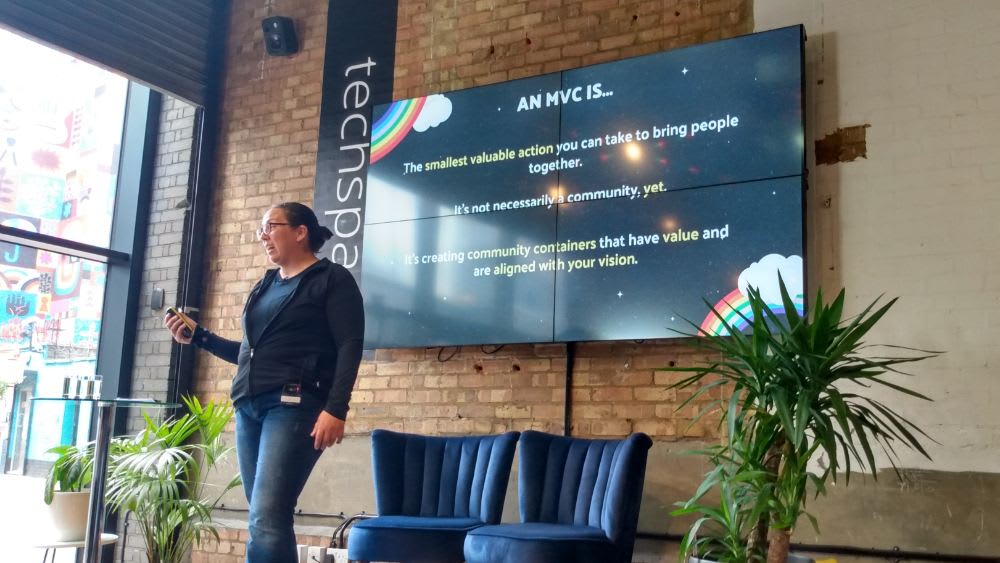
Rosie Sherry is one the world's most respected community builders and is the founder and Community Executive of Rosie.Land.
One of the most frequent questions Rosie gets asked is “how do you start a community?”
It’s a question usually accompanied by no budget, no team and pressure from managers to get started. The Minimum Viable Community concept is Rosie’s answer.
Inspired by the Minimum Viable Product theory, an MVC is simply a bitesize and comprehensible way to describe doing the work of building a community. Ideas, inspiration and insights come from getting started, experimenting, and getting feedback from your emergent community.
What does an MVC look like in practice? It’s taking “the smallest valuable action you can to bring people together”.
It’s not about choosing tools, placing ads, long discussions or a huge budget – what Rosie calls “the community funnel of hope” – but about starting with what you have, choosing a “community container”, and then evaluating and learning from your efforts.
An example might to start with your volunteers, teams or existing followers, or just your ideas, vision or credibility. A community container is an activity or a curated group of activities – the “things people do in community” including conversations, teaching and curation, through a medium like an event, shared document, blog or challenge.
Outline your hypothesis for your chosen action and your expected outcomes, then analyse the results and decide the next steps based on the real signposts from your emergent community. Rosie sums this up as “add, adjust, delete”.
This session from @rosiesherry about Minimum Viable Communities is awesome and new #cmgr pros should without a doubt check her out and take note. It doesn't have to be big bang, just do something that moves towards your MVC. #GuildCommunitySummit pic.twitter.com/tVwfdmpn82
— Nick Emmett (@nickemmett) May 19, 2022
What we learned from Mike Joslin, Lead Marketing Officer, National Education Union (NEU)
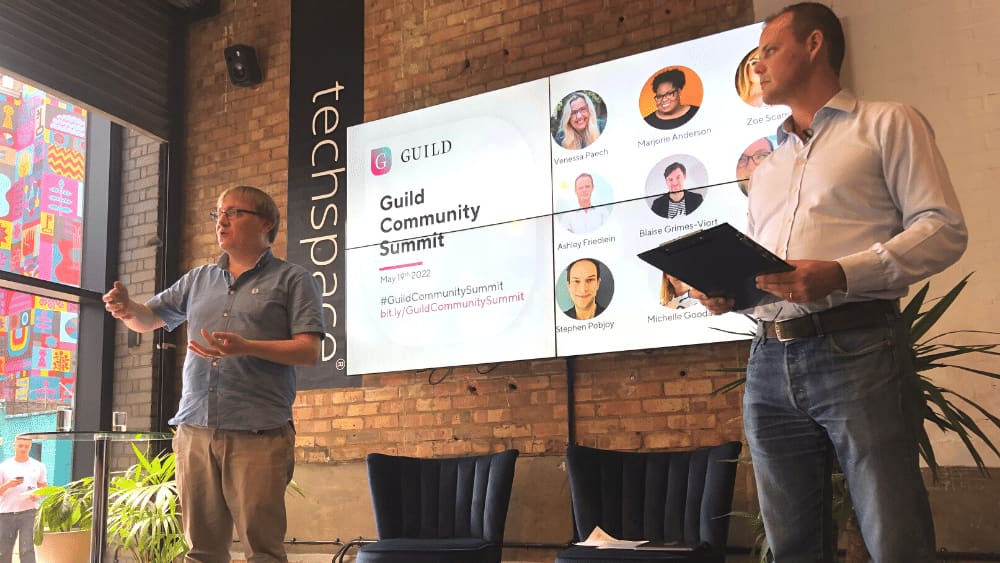
Following a successful career in politics, Mike joined the NEU, one of the largest member associations in the UK, to bring a data-driven approach to member engagement.
He talked us through how the NEU supported its members through the coronavirus pandemic with community, technology, research and large-scale engagement events including 400,000+ NEU members on a Zoom call.
Using bespoke technology and machine learning in line with GDPR, the NEU has built its own internal dashboards and member communications system that understands hundreds of different member personas and delivers the right information at the right time, measuring the impact and constantly refining the process.
Combining insights from hundreds of data sources across social media, surveys, advice line calls and Guild groups and communities for its members, the NEU is able to evaluate how members perceive the organisation, how engaged they are and how likely they are renew their membership.
Qualitative data from community is combined with quantitative data to build full pictures and guide effective member communications and campaigns, supporting both member recruitment and retention.
Mike’s explanation of how data, analytics and community can power communications was a highlight for many attendees – here's Stuart Bruce’s more detailed look at Mike’s NEU presentation.
Finale of the morning session at #GuildCommunitySummit is with the NEU's Mike Joslin talking about how the union makes effective use of community to engage people around education issues, how they measure success and what tools they use including @tryGuild https://t.co/l0PUMYDzSQ pic.twitter.com/Ua5qMUGecz
— Guild (@tryGuild) May 19, 2022
What we learned from Stephen Pobjoy, Senior Stakeholder Lead at Chartered Institute of Personnel and Development (CIPD)
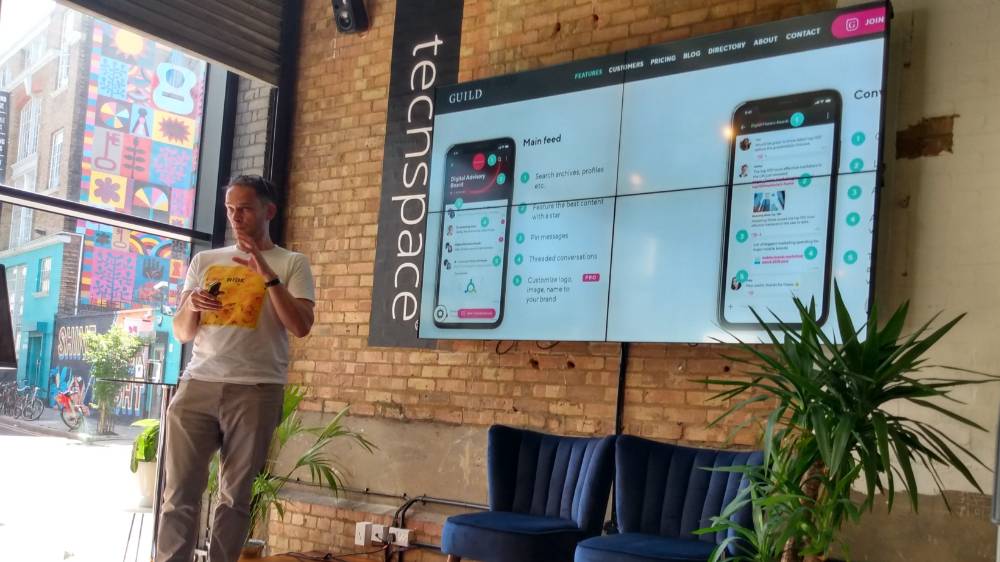
Another of the UK’s largest membership bodies, the Chartered Institute of Personnel and Development (CIPD) represents more than 160,000 members of “the people profession” in all its guises.
Stephen Pobjoy, Senior Stakeholder Lead talked about how the CIPD transitioned from a “very face to face, traditional” member engagement approach as a result of the pandemic - and how it became more effective at understanding different areas of its membership as a result.
Chief People Officers and equivalent roles came under huge pressure when the pandemic suddenly transformed working practices with companies “rewriting policies, hourly in some cases”.
Building an online community on Guild to allow knowledge sharing and disseminating advice during that difficult time has had unexpected benefits. Members feel safe and confident to discuss sensitives topics like salary, benefits and rewards with each other.
The CIPD learned from this experience of building the HR Leaders community to benefit the whole profession, while still respecting the confidentiality and anonymity of its members. “We now have a method where we can say actually we're listening - how can we support you in your role?”
Stephen illustrated how the CIPD has built a strategy to expand its community from an initial core group of 80 senior HR leaders, to niche groups and communities for topics like learning and development and inclusion and diversity.
Core members nominate people who should be in those groups so that each community has a solid foundation of expertise and enthusiasm. He warned that each group needs a tailored plan – “you can't just have a sausage factory approach” and some groups have additional moderators, facilitators and sponsors or “noisy champions” from within the organisation.
B2B community tips #2 - use noisy experts and ambassadors to keep discussion - cultivate a mini-community amongst them. Tech is key but the people running the platform is critical @pobjoy #GuildCommunitySummit
— Joel Harrison (@joel_b2beditor) May 19, 2022
What we learned from Marjorie Anderson, Founder, Community by Association L.L.C.
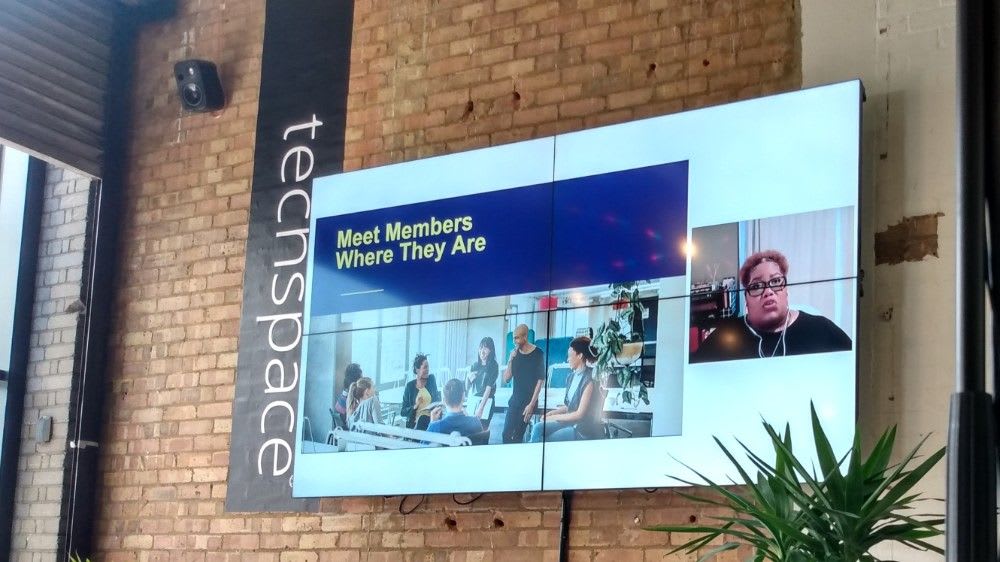
Marjorie Anderson is another Community legend. Beaming in from another time zone Marjorie is a highly experienced US community management professional and has built a large global community for associations, Community by Association, L.L.C.
Marjorie drew comparisons between UX design and community design – both aim to turn out “products or experiences that are pleasing to the end user”.
She explained that the tools to do this - from user research to developing personas - need to be employed from the start to be most effective.
“The goal is to design experiences for your community members that they're going to find enjoyable, that they're going to find some value in that keeps them coming back to your community.”
The starting point is to talk to your community members or potential members about what they expect and what would keep them coming back. Building off their responses you can create personas – the plural is essential – and create experiences and content that work for them.
Marjorie warned us that community builders often get stuck at this point and it’s important to realise that “community is not just a destination”.
Following your member personas along their user journey, having conversations and gathering data, through surveys and other methods at every stage will help you to “facilitate connection” and keep members coming back when they need you, and acting as “silent ambassadors” when they don’t.
She noted: “it's not always what happens in your community, but what happens because of your community”.
Designing your #b2b community as if it were the last stop on the #customerjourney is a big mistake! @MarjorieAyyeee #GuildCommunitySummit
— Joel Harrison (@joel_b2beditor) May 19, 2022
Great insights, @MarjorieAyyeee #GuildCommunitySummit https://t.co/tC76rpn3rF
— Christie Fidura (@cfidurauk) May 19, 2022
What we learned from Zoe Scaman, Founder, Bodacious
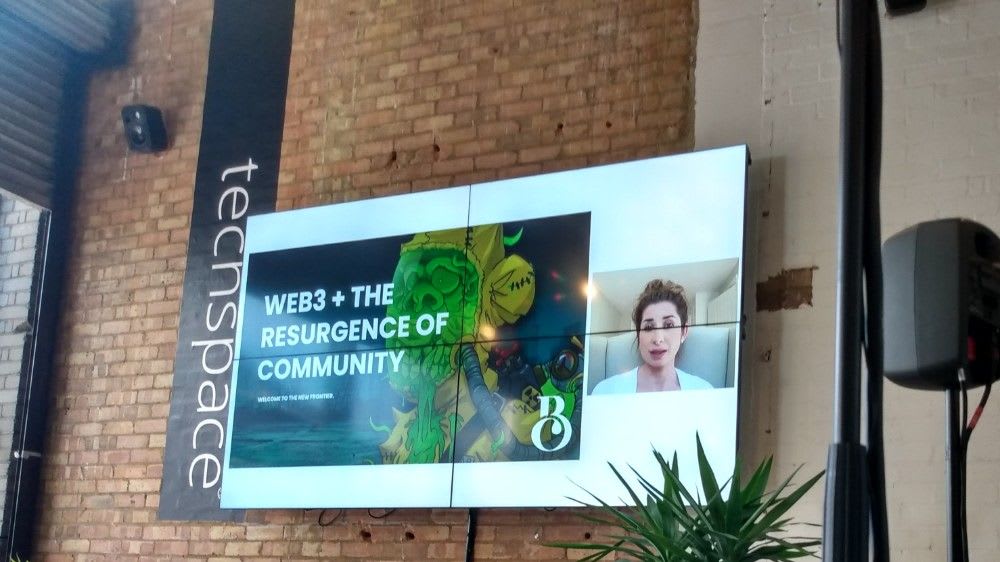
Events and community work incredibly well together - see our How to combine Events with Community: best practice guide.
To highlight how Guild can be used during an event, we ran a poll in the Guild Community Collective group which showed that the attending community professionals have a mixed bag of knowledge around the opportunities and threats of Web 3 and its connection to community building.
Keynote presenter Zoe Scaman sadly couldn't make the event in-person due to illness but through the wonder of Zoom she presented an eye-opening session on 'Crypto, Co-ops and Community' to help us all reframe our thinking about community, commerce and ownership.
We ran a poll in Guild Community Collective which showed that many community professionals remain confused by the opportunities and threats of Web 3 and even its connection to community building.
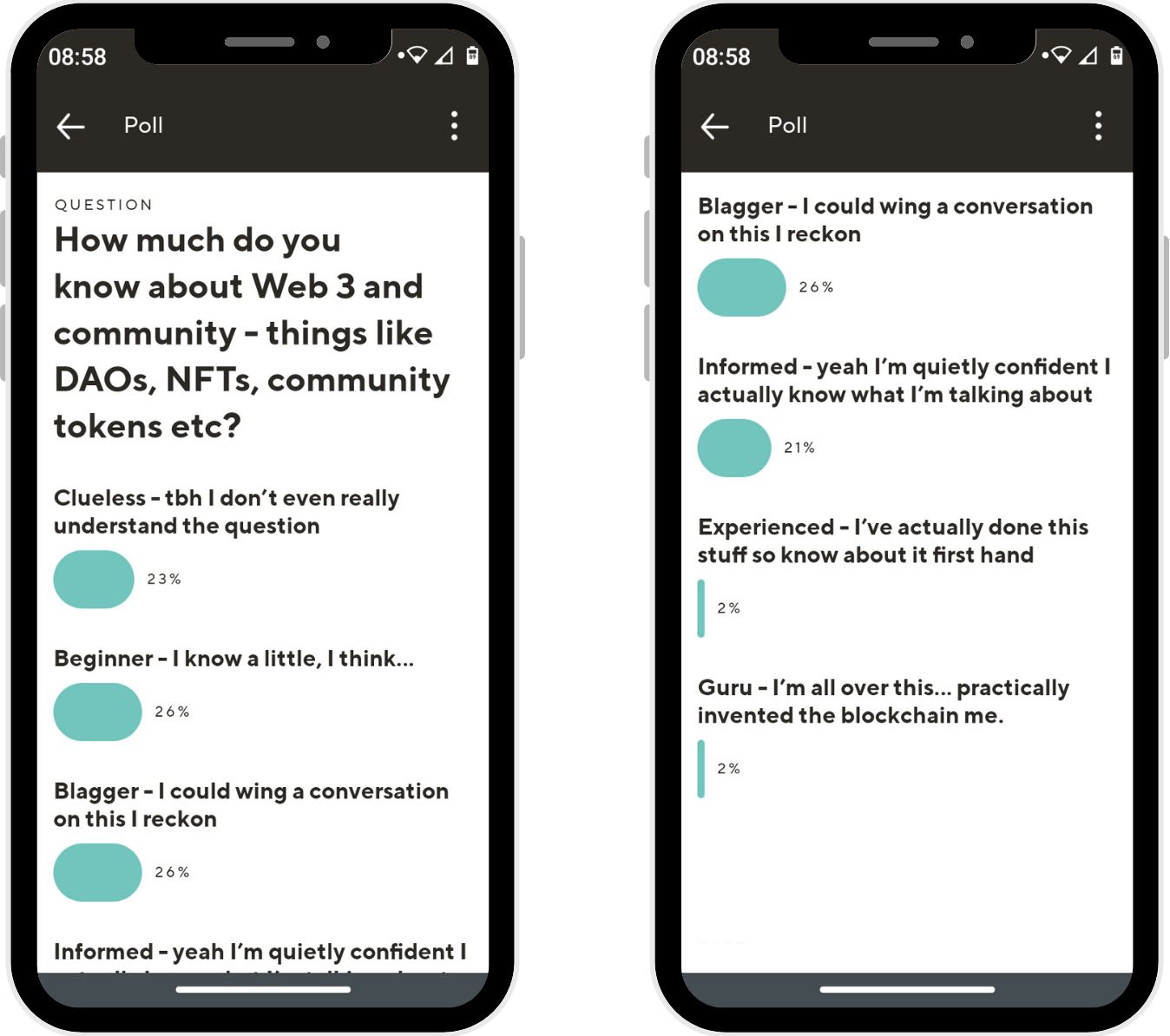
Zoe explained that the ownership economy allows participants in internet culture and communities to earn a stake in their creations, “allowing for effort to equal equity”.
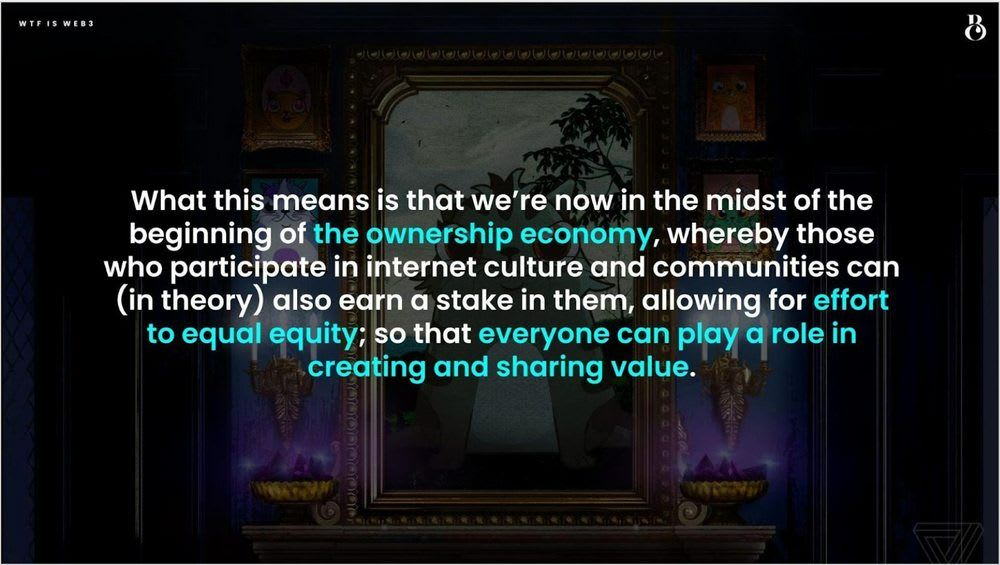
She illustrated how blockchain, though not a perfect solution, can help track how digital goods and digital work are bought, sold, earned or owned. She introduced a number of “headless brands” which are run by communities of people “reinventing our understanding of what a brand can and should be”.
We saw examples of NFTs used as membership keys by brands like Poolsuite and Adidas, tokens used as fan currencies by sports clubs and musicians, and DAO examples in Web 3 social clubs like LinksDAO and Fly Fish Club or modern day co-ops like Maxwell Social.
For Zoe, the success and impact of these ventures is proof that in the next six to 12 months:
The opportunities to combine NFTs, tokens and DAOs will “release brand-new experiments and brand-new potential and possibilities for the world of communities like we've never seen before”.
We are in this new stage of people owning a stake in a piece of the web.
— Blaise Grimes-Viort 💙 (@blaisegv) May 19, 2022
We've been making this stuff for free but organisations have extracted value for themselves. Web 3.0 gives us the option of making a living from our output as well.
#GuildCommunitySummit
What we learned from Michelle Goodall, CMO at Guild
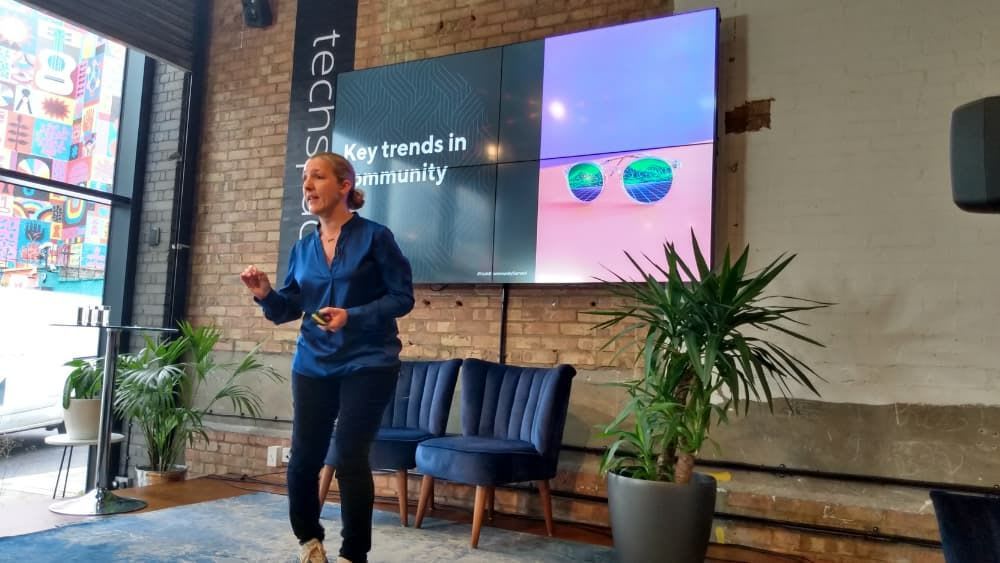
Michelle has 25+ years of marketing, comms, community building and community management experience dating back to Usenet and early web forums in the 1990s, travelling through the virtual worlds trend and in to all forms of social media.
She's an expert in community strategy having guest lectured at Manchester Metropolitan University in the early 2000s and has helped to develop community strategies with RS Components, publishers Penguin Random House and many other B2B and B2C brands on community strategies. She is also the creator of the first ever Periodic Table of Community Strategy which gained a lot of love at the summit.
Periodic table of… COMMUNITY!
— Lizzy Roberts (@imalizzzard) May 19, 2022
It’s science, right?! ;) #GuildCommunitySummit @tryGuild pic.twitter.com/juEe4vpGEQ
Michelle explained how crises are a lever for technical and societal change and how the pandemic accelerated the expansion of community as an industry and discipline in recent years. “A very fundamental human need to connect to people” was even more evident as society and businesses became increasingly isolated during repeated lockdowns.
Quoting Edelman's Trust Barometer and the tracking of public trust shifting from institutions, the media and business towards people we know and people we respect, communities are starting to attract the attention of businesses.
Increasing investment and a maturing professional approach, especially by technology companies, means community is a fast developing industry and Michelle outlined some of the key trends in community including:
- The continuing increase in investment in technology, teams and growth in community in 2022
- Community science and its application to hybrid and remote working models
- Growing recognition – and salaries – for community managers
- Community represented in the C-suite – “2022 and beyond will see the 'Community CEO' - leaders plugged into multiple stakeholder communities.”
- Community as a business model with examples from the creator / passion economies and the “next phase of media”
- New community governance models
- Community ethics - and the importance of avoiding "Community Washing"
- Migration of communities away from social media to dedicated or bespoke platforms
- The convergence of community and events – with Guild Community Summit setting an example in the Guild Community Collective
Read this detailed report on Community Trends which covers 14 community trends to watch in 2022 and beyond.
What we learned from Blaise Grimes-Viort, Founder, Blaise GV Consulting
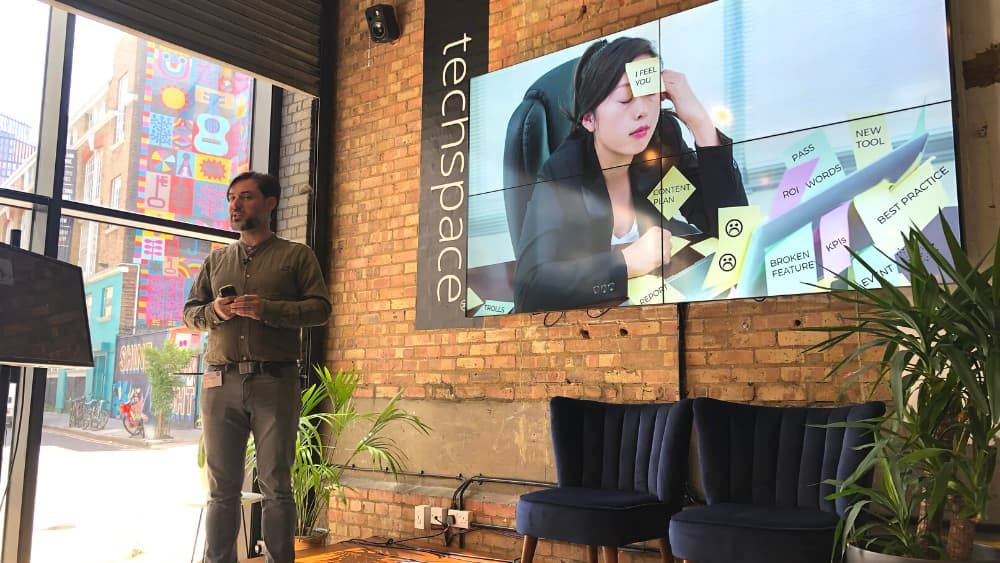
Blaise has 20+ years’ experience in community strategy and has covered most community roles in his time.
Blaise helped to explain exactly what Community Ops is - the nuts and bolts of community that is important to understand, given the acceleration in the number of businesses and organisations seeking support to plan, launch and sustain their communities, groups and networks.
He introduced the Community Roundtable Community Skills Framework and invited the audience to share their most challenging community tasks, which included content planning, proving ROI, meeting KPIs, battling trolls and mastering technology.
He introduced a useful Community Operations Model to categorise the different skills required by community professionals.
These included:
- Planning - e.g. goals, structure and a strategic roadmap
- Processes - e.g. engagement workflows and UGC management
- Suppliers - e.g. community platforms and CaaS (Community as a Service) agencies
- Support - e.g. budgeting and templates and playbooks
The sheer volume and variety of skills required for community management or providing #CommunityAsAService is pretty mind-blowing. As demonstrated by @blaisegv at @tryGuild’s #GuildCommunitySummit pic.twitter.com/DvWvDzjFZn
— Darryl Sparey 📈 (@DarrylSparey) May 19, 2022
What we learned from Ashley Friedlein, CEO, Guild
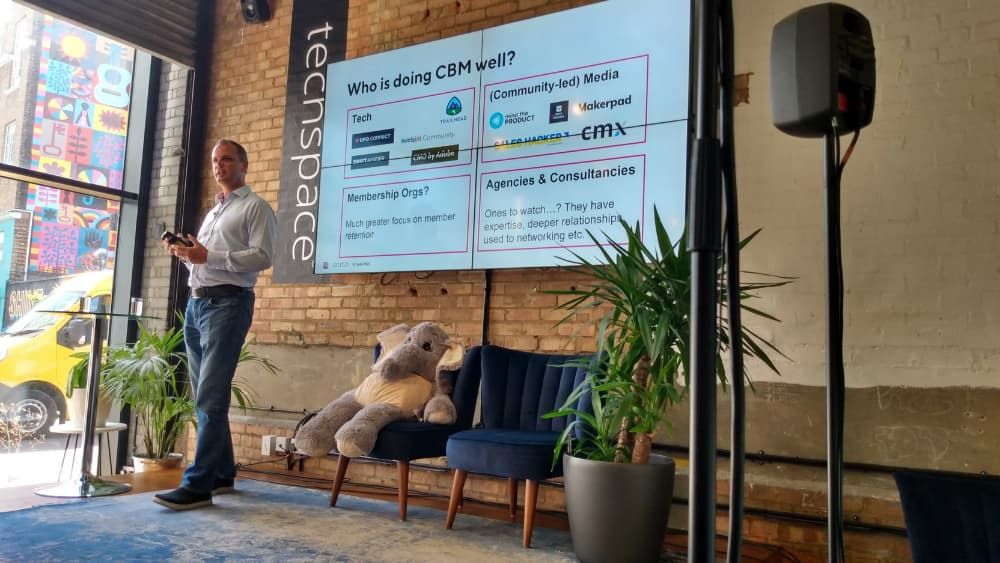
Ashley has 23+ years of experience in both community and marketing and was the founder of Econsultancy, a global community of 600,000+ marketing professionals.
He gave us an update on the state of Community-Based Marketing (CBM), a term he coined with Michelle Goodall in 2020 to describe how organisations “bring professionals together around a shared practice or area of expertise to create closer, and more valuable, relationships with prospects and customers”.
He hinted that tech vendors may know something about communities that other industries don’t, with examples of companies like Salesforce, Stripe, Pendo and Zapier buying existing communities in recent years to support brand building and lead generation.
The attraction of Community Based Marketing (CBM) is that it cuts through noise and saturated marketing channels, leading to lower Customer Acquisition Costs (CAC) and higher Lifetime Value (LTV).
Hosting a community that offers genuine value for prospects or customers means when a need for your product/service arises, you’ve got an existing relationship and a customer who trusts you already is more likely to consider you as a supplier.
Ashley went on to look at where CBM sits in the marketing funnel, what outcomes community can achieve for businesses including providing customer support, content, and product feedback, the value of community intelligence, and the opportunities for businesses and communities to collaborate through sponsorship models.
He finished with some specific examples of Community based Marketing (CBM) done well and the ROI achieved, from HRTech, B2B and M&A consultancies, media advisors, membership organisations and agencies.
Unsurprisingly, the PR agencies attending the summit identified community and Community as a Service (CaaS) as a huge opportunity for the PR sector. Purposeful Relations co-founder Stuart Bruce wrote on his PRFuturist blog:
"Ashley’s presentation identified community based marketing as sitting at the Interest/Consideration, Desire and Loyalty/Advocacy levels in the traditional marketing funnel. The same place as public relations sits (with the addition of Awareness at the start). Neither CBM nor PR are best at Action/Conversion, but they both play an essential role in ensuring action is possible."
Community based lead generation - tech companies and community -led media businesses do it well and some agencies/consultants - an ROI example from @AshleyFriedlein #GuildCommunitySummit #community #Communitymanager pic.twitter.com/03HwQl1JKH
— Michelle Goodall (@greenwellys) May 19, 2022
What we learned from the roundtable working sessions
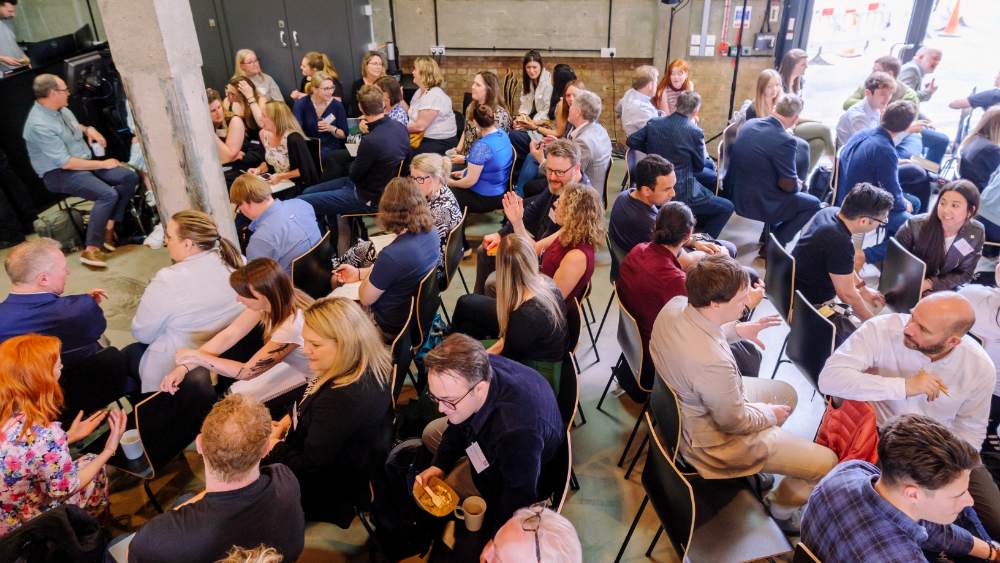
Well, it 100% backed up what we're seeing in the Guild Community Collective, a free community for community professionals, namely that people building groups, networks and communities are extremely generous with their help and support for their peers.
A room full of community professionals, whether that's virtual or in-person makes for a very collaborative and kind space.
These sessions were led by Michelle Goodall, Blaise Grimes-Viort, Rosie Sherry and Ashley Friedlein.
Community topics discussed included:
- The first 12 months of a community - what to expect and what to measure
- Community engagement techniques - especially in a hybrid world
- The value of less active members, not 'lurkers' or as Marjorie Anderson later described them “silent ambassadors”
- Community investment and support from leadership
- Niche v broad communities
- Reputational risk in big brand communities
- Setting community guidelines and a purpose
- Growing a community while keeping your “core community” happy
- Curation and the value of “interviewing” members
- Spotlighting community stories
- Getting senior staff to contribute expertise that community members value
- Dealing with commercial pressures on communities
- Whether events are communities (conclusion – they aren’t, but they can help to grow one)
- The right mindset for community strategy
- Community as a way to reduce dropout in online education
- Why trade associations are generally bad at communities (but can build the best communities)
- Community cohorts to build cohesion
- The importance of testing and learning in community strategy
- How to work effectively with community ambassadors and community volunteers
- Community governance - the main challenges when working with volunteers
- Community monetisation
Learn more from these community experts and fellow community professionals
To access speaker slide packs and videos from the event and to be the first to hear about Community events join the free community - Guild Community Collective.
You’ll be in the company of hundreds of knowledgeable, supportive community professionals from across the world – there’s no better place to be to learn about community and to pick up resources and advice.
